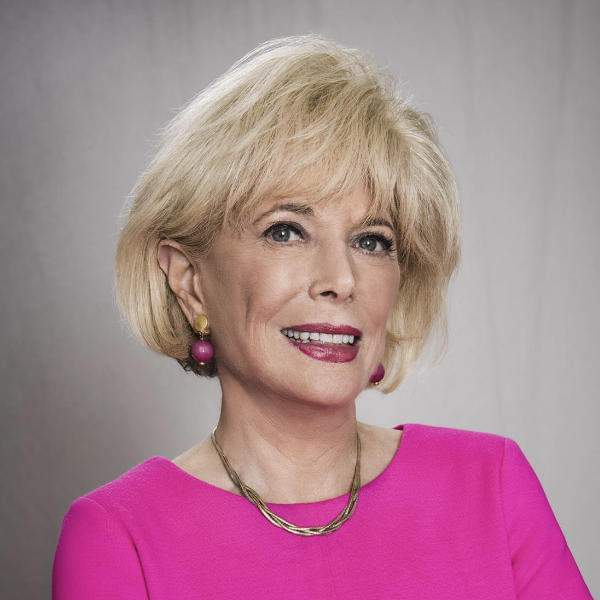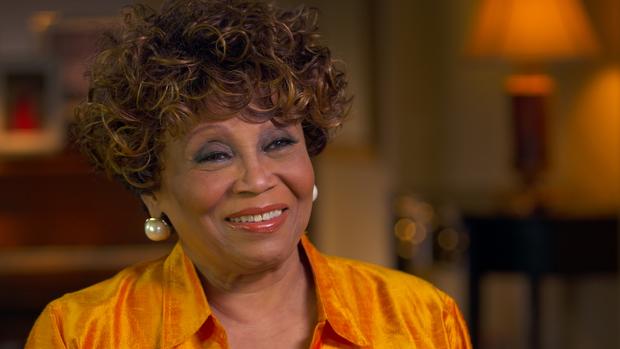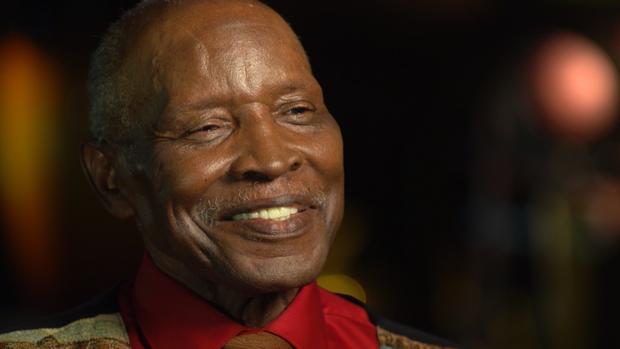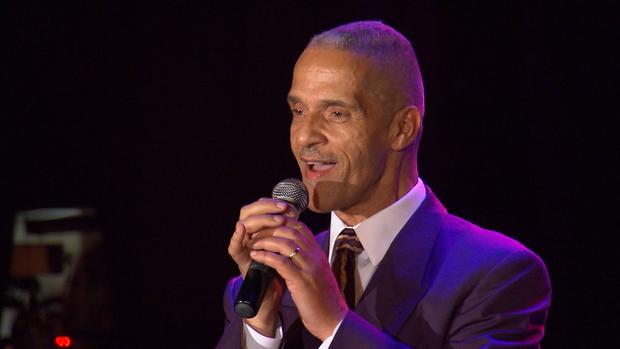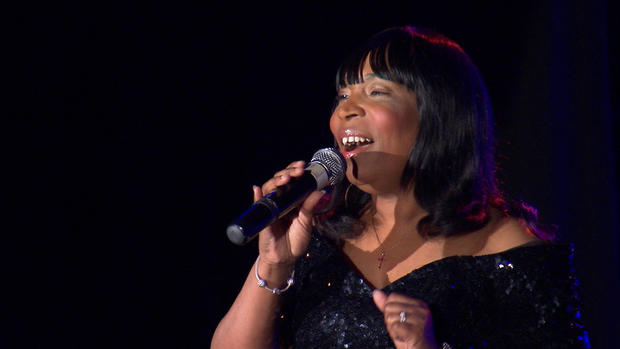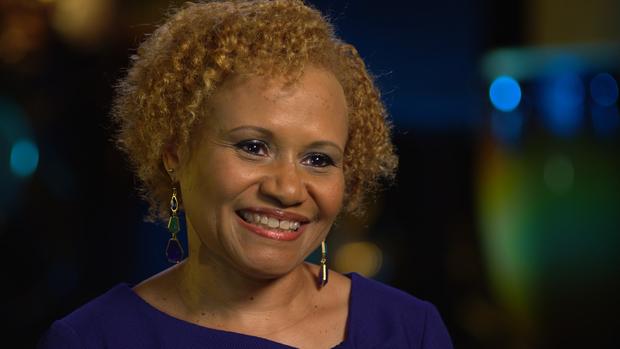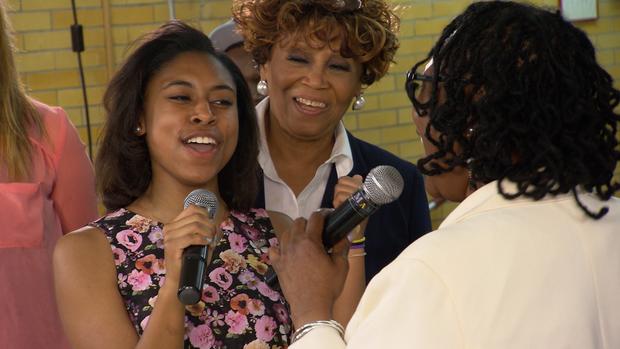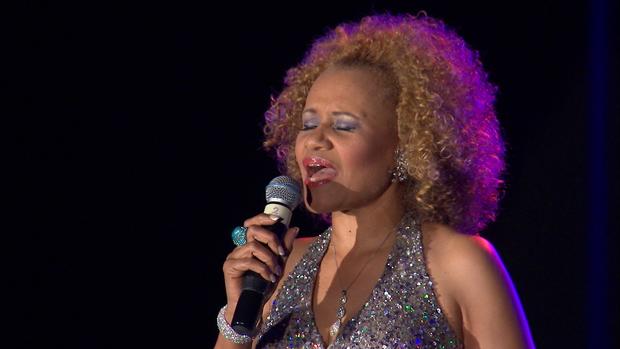Alive and Kickin'
The following script is from "Alive and Kickin'" which aired on January 4, 2015, and was rebroadcast on July 12, 2015. Lesley Stahl is the correspondent. Shari Finkelstein, producer.
A show opened in New York recently that didn't get a whole lot of attention, but it features some of the most powerful singing voices you've never heard. You haven't heard them because for most of the performers, this is their first time on the stage. They've been singing their whole lives -- in church, in amateur groups, in the shower -- but like so many who had dreams of making it big, life somehow got in the way.
As we first reported in January, the show was created by a theater producer and former disc jockey named Vy Higginsen, who has made it her mission to preserve a special part of American culture: African-American music, both gospel and popular music like soul and R&B. She found a pool of untapped talent, men and women in what she calls their "second half of life," just waiting for their chance to shine.
Learn more about Vy Higginsen's mission at the Mama Foundation for the Arts
The show is called "Alive: 55+ and Kickin'," and while that certainly fits the men and women who fill this Harlem stage on Saturday afternoons, "Alive" also refers to the music, and that is just how Vy Higginsen wants it.
Vy Higginsen: The older people carry the music in their body, in their mind. If they die, then that sound may be gone forever.
Her idea was not just to celebrate the music. She also wanted to produce a show about the life experiences and struggles that created it. She figured she'd start by finding the voices -- then write stories for each character afterward. At least that was the plan over a year ago when she put out the call for auditions.
Vy Higginsen: We talked about it on the radio, auditions for 55 plus and they said, "This is a youth-oriented society. Nobody wants to hear about us." I want to hear about you!
"The older people carry the music in their body, in their mind. If they die, then that sound may be gone forever."
Theo Harris, 65, was one of more than 200 people who showed up to audition. He had caught one of the radio announcements on his way home from work.
Theo Harris: I pulled the car over to the side of the street. I said, "This is what I've been waiting for."
Lesley Stahl: 55 and over, I'm there.
Theo Harris: I'm there. That's for me, yes.
Debbie Bingham, 56, always wanted to sing, but she needed a steady job to raise her family, so she became a nurse.
Debbie Bingham: I worked in pediatrics, in the trauma center, so I did a little bit of everything.
Lesley Stahl: Did you ever dream of being a professional singer?
Debbie Bingham: All the time.
Renee Walker, also 56, works for her local school district.
Renee Walker: When I started working there, I told myself it would just be a temporary job until I made it as a singer. So I've been there 31 temporary years.
In some cases the talent was obvious. In others, like a 75-year-old named Matthew Brown, a little less so...
Vy Higginsen: Oh, Matthew Brown. When he walked through the door, he came in. He was bent over, looking down, and I was thinking to myself, what's gonna happen here?
Lesley Stahl: He-- he's not right for this show.
Vy Higginsen: Well, I don't know. I mean, look at- woo.
Lesley Stahl: She looked at you and said, "Unh-uh."
Matthew Brown: Yes. Yes. Yes.
Lesley Stahl: She told you that?
Matthew Brown: She told me that.
Vy Higginsen: He took the mic. He pulled his shoulders back. He started to sing. And I fell out in my chair. Ahhh!
Matthew Brown: [sings] ...shall always be my song of praise.
Vy Higginsen: My God! That's what I'm looking for.
Matthew Brown: And I looked at her. And she straightened up.
"He took the mic. He pulled his shoulders back. He started to sing. And I fell out in my chair. Ahhh!"
Vy Higginsen: Who sings like that today? You can't turn on the radio and hear that. But I heard that when I was a young girl.
He sounded to her like Nat King Cole.
Lesley Stahl: Did you know you had-- that you got it?
Matthew Brown: I-- I-- I told myself, "You got it." But I won't-- I-- I won't say anything. [SMILE]
Vy heard a different sound in Theo Harris' voice.
Vy Higginsen: I put him a little bit in the crooner doo-wop section--
Lesley Stahl: The doo-wop.
Vy Higginsen: The doo-wop time.
Vy's plan had been to create a story for each singer that would match their individual sound. That was before she knew what kind of stories were right in front of her. Theo Harris revealed at his audition that he had spent time in prison. When he said how much time, he wasn't sure anyone heard him correctly.
Theo Harris: Greg Kelly who was the pianist said, "Wait a minute, how many years did you say?" And I said, "40."
[Greg: Forty?
Theo: Yes.
Greg: Four zero?
Theo: Yes. ]
Theo Harris: And that's when Vy heard it.
Vy Higgensen: Forty years in prison?
Theo Harris: In and out.
Harris told her he had committed burglaries, many in her neighborhood, Harlem, to get money to feed a drug habit. Vy told us she was conflicted, but when she and her husband and collaborator, director Ken Wydro, made their choices and assembled a cast to start creating the show, Theo was sitting front and center.
Lesley Stahl: Why did you pick him, if he's this person who destroyed your neighborhood?
Vy Higginsen: Because he's part of it. He's part of the big picture. I can't ignore that. And perhaps it was necessary for him to have a second chance. Perhaps he deserved it, another chance.
And Theo Harris wasn't the only one they had chosen with a dramatic story -- and he wasn't the only one who needed a second chance. Matthew Brown, born the fourth of 13 children in North Carolina, had spent most of his life illiterate.
Matthew Brown: I was just ashamed, or I don't know what it was. But I just-- just couldn't learn. You pull up a piece of paper and say, "Read one word," I'm ready to run some place.
For decades, he drank, until the alcohol started to affect his singing voice, and that terrified him.
Matthew Brown: I remember the last drink I had. It was a guy I was drinking with. I told him, I said, "This is the last drink you ever gonna see me drink."
Lesley Stahl: Of course, he didn't believe you. But was it the last--
Matthew Brown: He might have been too drunk-- that was it.
Lesley Stahl: That was it?
Matthew Brown: That's been 28 years ago.
Lesley Stahl: 28 years ago.
Matthew Brown: November the 2nd, 28 years ago.
Vy Higginsen: When we heard his story, I just fell apart. I just-- that's when you knew that you had to tell that story.
Lesley Stahl: Yeah, you couldn't--
Vy Higginsen: You can't-- you couldn't really make that one up.
It was a turning point. Vy and Ken decided to take a risk -- to have each singer tell his or her own, true story, paired with a song. Debbie Bingham, the nurse, wanted to talk about losing her son. He passed away four years ago.
Debbie Bingham: My son was diagnosed with cancer when he was 34 years old.
Lesley Stahl: Oh, my word.
She's the one who took care of him.
Debbie Bingham: It didn't matter how much I knew. It didn't matter how much I helped other people, I just couldn't do anything.
Debbie knew what she wanted to sing in the show -- "I Will Always Love You," the song made famous by Whitney Houston.
Debbie Bingham: Only problem was, Vy wasn't crazy about it at first.
Vy Higginsen: I wasn't sure.
Lesley Stahl: Why weren't you sure?
Vy Higginsen: If that song is not sung the right way, it misses big time.
Debbie Bingham: Ken said, "Yes." Vy said, "No." Ken said, "Why not?" Vy said, "Because." And I said to her, "If you give me the chance to show you, I promise you you won't be disappointed."
Vy Higginsen: How do you say no to that?
Lesley Stahl: You can't say no--
Vy Higginsen: I can't say no to that. But I did say, "OK. But have another song just in case."
Theo Harris wanted to sing about his time in prison...And how it was music that got him through.
Theo Harris: They had a 10 o'clock quiet bell, which meant all talking ceases. So one evening, I started singing. And it was real quiet. And then when I finished, I heard somebody say, "Who was that singing?" And I-- hesitantly, I said, "That was me." They said, "Well, keep singing."
Lesley Stahl: Keep singing.
Theo Harris: Keep singing. I was their radio from that point on.
Lesley Stahl: Any song you felt like?
Theo Harris: And-- well, they-- and took requests.
Lesley Stahl: Oh took requests?
Theo Harris: And took requests, yes.
Harris used his prison time to get an education -- a college degree and then a master's in playwriting. When a musical he wrote was performed at the prison, music brought him something else -- a leading lady.
Phyllis Harris: Of course they had to get somebody from the outside, 'cause it's all-male prison. And so my sister Doris, she volunteered me.
Phyllis and her sister do volunteer work at the prison through their church.
Theo Harris: So when she came in, we saw each other for the first time. It was just some chemistry there.
Lesley Stahl: Right away?
Theo Harris: Right away.
Lesley Stahl: Did you know that he had been a drug addict?
Phyllis Harris: After our first meeting.
Lesley Stahl: He told you everything?
Phyllis Harris: Our first visit, he told me everything.
Lesley Stahl: And she played your wife?
Theo Harris: She played my wife in the play. And seven months later she became my wife.
Lesley Stahl: She married you while you were-- behind bars?
Theo Harris: While I was in prison, yes.
Turns out Vy had cast Phyllis in the show without even knowing she was Theo's wife.
Vy felt she was hearing the stories of a generation -- the generation that came of age during the era of urban decay and the struggle for civil rights: the black baby boomers.
Vy Higginsen: That was one of the most creative musical time periods. There were sounds that were created out of the emotion.
But not everyone in the group had such dramatic stories of struggle. Renee Walker, the school clerk, raised her two children in a middle-class suburb.
[Ken at rehearsal: Ok, whoa whoa whoa, what were you feeling singing that? Just now, what were you feeling?]
Renee Walker: It's hard for me, because I don't really like to talk about myself that much, not my, my innermost feelings. But Ken was adamant about us getting in touch with our feelings
They decided Renee would sing about something that was really more success story than tragedy -- watching her sons leave home to go off to college.
[Ken at rehearsal: And what did you feel when you had to say goodbye?
Renee: Sad.
Ken: Sad.]
Lesley Stahl: You wanna sing on the stage-- it has to come out.
Renee Walker: It has to come out.
And there was one last story...from a man named Matthew Burke. He and Theo Harris had sung together in prison. He sold drugs, and committed violent armed robbery -- but what he wanted to talk about in the show was what he had recently discovered in a case file about the first weeks of his life.
Lesley Stahl: It says that you were abandoned at two and a half weeks in a hallway.
Matthew Burke: Yes.
Lesley Stahl: Mother unknown. Father unknown.
The first thing most of us get from our parents is a name. He was simply -- "abandoned #2360."
Lesley Stahl: You are a number.
Matthew Burke: And you wanna know something? I became 81A3684. I became 00A6432. That's been my life, a number.
Lesley Stahl: You're smiling. But you don't mean it.
Matthew Burke: Right. And that's the defense mechanism.
Lesley Stahl: 'Cause it's horrible.
He was named Matthew Burke by a priest in the first of many foster homes. When he sings the song "Georgia," he told us he's trying to give a name to what he lost.
Matthew Burke: If I had to give my mother a name. And I could give her a name. I can. It would be Georgia.
Lesley Stahl: I know a psychiatrist who says the most important question she asks somebody is, "When you were growing up, who loved you?" Do you have an answer?
Matthew Burke: That's very difficult to answer-- who loved me-- because there's different types of love.
Lesley Stahl: Uncondition. I mean--
Matthew Burke: Yeah, unconditional--
Lesley Stahl: That's what I mean.
Matthew Burke: I've never-- I've never experienced that.
Lesley Stahl: So you-- you have no answer for that question.
Matthew Burke: I have no answer. To this day I have no answer to that.
It was daring, bringing real people, none of them trained actors, to tell their own stories on the stage. What happened when the show opened, when we come back.
Part Two
We first met Vy Higginsen a few years back, when she launched Gospel for Teens, a program to teach the hip hop generation the art of singing gospel. The teens are still coming, more and more of them each year. It's all part of her drive to keep this music alive -- and what better way to do that than to bring the young and the old together?
We were there when Vy invited her over 55 crew to a Gospel for Teens class for what she called an intergenerational exchange.
[Vy Higginsen (in class): Come on, Matthew. (applause)
Matthew Brown: (sings) That Old Man River, he don't say nothing...]
Vy wanted to know what the kids heard in Matthew Brown's voice...
Student: I hear the journey that he lived, coming from segregation, coming from racism. I feel all the pain that our people had to endure, just by listening to his voice. And I thank him so much for sharing that with us.
Vy Higginsen: Wow! [applause]
She wanted the kids to try to copy the sounds they'd heard.
[Roberta Ross w/ Sateena Turner: "Troubles of the world"
Roberta: [sings] "Soon I-I-I-I will be done..."
Sateena: [sings] "Soon I-I-I-I-I will be done..."
Roberta: Take your time.]
Vy Higginsen: The older people are passing it on to the younger generation so the younger generation can pass it on to the next generation.
Lesley Stahl: And this is your mission.
Vy Higginsen: I don't want this music to die.
[Roberta: [sings] "I'm goin' home--"
Sateena: [sings] "I'm goin' home--"
Together: [sings] "--to live with God."]
"The older people are passing it on to the younger generation so the younger generation can pass it on to the next generation."
There sure didn't seem to be any risk of any music dying here, as Vy's group took the stage to perform "Alive: 55+ andKkickin'," before a packed house in Harlem.
Renee Walker: Vy has a saying. The first 50 years are for learning, and the second 50 years are for living. Life just begins when you're in your 50s.
[Matthew Brown sings: Amazing Grace shall always be my song of praise...]
It's a message that feels a lot like redemption. And that's what comes through in the music, and the real life stories, as when Matthew Brown, the 75-year-old janitor, tells the audience about his battle with illiteracy.
[Matthew Brown in show: I couldn't read or write. And when I turned 16, I started to drink. And then, I was 50. But I had no give up in me! I went back to school [cheers] to learn to read and write.]
He started writing poems, and even entered a poetry contest--
[Matthew Brown in show: I took third place.]
Then two years later, an essay contest.
[Matthew Brown in show: I took first place!]
Theo Harris: No matter what life has thrown at you, no matter what you have done throughout your life, there's always a chance to get it right.
Lesley Stahl: Always.
Theo Harris: And this play, it's not even a play. This is real people telling real stories who have been through real struggles. And it's been a healing process for me.
[Theo in show: [sings] Oh my love, my darling...]
When the man who spent more than half his life in prison, sings about hoping his wife will wait for him, it feels as though the song is his story.
[Theo sings: Are you still mine? I need your love...]
"No matter what life has thrown at you, no matter what you have done throughout your life, there's always a chance to get it right."
But as in so many stories, this one had another twist. Seven years after Theo got out of prison, he started using drugs again. He robbed a hotel clerk, and ended up in jail.
Theo Harris: I've never contemplated suicide in my life until that night. I didn't want any human contact and I certainly didn't want to call my wife.
Phyllis Harris: Very early Sunday morning, the phone ring.
Theo Harris: And I said, "I'm in jail." And I'm saying to myself, "She's gonna hang up. She's gonna leave me."
Phyllis Harris: He got silent. And I said, "Do you love me?"
Theo Harris: And I started crying. I said, "Yes, Phyllis, I love you." She said, "Well, I'll be there for you." She said, "We'll get through this together."
Theo end of song -- You know I need your love...; Phyllis starts to walk out onto stage
Phyllis Harris: Then when I said it, I'm like, "What"-- I'm sayin' to myself, "What did I say?
Lesley Stahl: You don't know why you said it?
Phyllis Harris: I don't know-- no. (laugh)
Lesley Stahl: But you said it?
Phyllis Harris: But I said it.
Theo ends song: To me...(hug)
She waited eight and a half more years.
[Renee in show: [sings] "If I could, I'd protect you from the sadness in your eyes."]
Then, a surprise. The woman with the least dramatic story -- singing about sending her children off to college -- gets the most emotional response.
[Renee in show: [sings] "And if I could, in a time and place where you don't want to be..."
Renee Walker: The song is a parent to a child, wanting the best of everything for that child. I could have written it myself, it's that real for me.
[Renee in show: [sings] "My yesterday won't have to be your way. If I knew--"]
Matthew Burke: I love all the songs. But that song for me. I sta-- she used to rehearse it here. And all the men were crying -- all the men. And they used to tease us and say, "OK, Renee's gonna rehearse the song. Bring the Kleenex to the boys."
When we looked backstage during her song, there they were...
[Theo and another guy in cast backstage, man wipes tear; Matthew listening backstage, looks emotional]
Matthew Burke: And I'm imagining in my mind that it's my mother saying that to me.
And when it's his turn--
[Matthew Burke on stage: Maybe you were just too young.]
Matthew Burke speaks to his mother, trying to understand why she abandoned him.
[Matthew Burke on stage: Maybe you were sick. Maybe you thought that what you did was best for both you, and for me.]
Then he sings to her -- the mother he had had to name himself.
[Matthew Burke: [sings] Georgia, whoa Georgia, the whole day through.]
Lesley Stahl: So have you forgiven your mother?
Matthew Burke: I'd like to believe that I've forgiven her fully.
Lesley Stahl: But you're not sure?
Matthew Burke: There's a lot of things that could have happened. And the only one thing that I hope was not the case is that she said, "I don't want this child."
Lesley Stahl: This child?
Matthew Burke: Me.
[Debbie Bingham sings "I Will Always Love You": But I know..]
After a son mourning the absence of his mother, a mother mourns the loss of her son with the song Vy hadn't been sure about.
[Debbie Bingham: [sings] And I will always love you.]
Renee Walker: You know, I've heard it said that if you lose your spouse you're a widow or a widower. If you lose your parents you're an orphan. But they said, "What do you call someone that has to bury their child?" What do you call them? We don't have a name for it.
Debbie Bingham: There was a time when I couldn't tell the story to anybody without just bursting into tears.
Singing about it, she says, helps.
[Debbie Bingham [sings]: And I wish you joy and happiness. But above all of this, I wish you love...]
There's a pause before the song kicks up into a higher key.
Vy Higginsen: They're cheering for her--woo
Lesley Stahl: If she makes it.
Vy Higginsen: --is she gonna get it?
[Debbie starts to sing after pause and key change: And I will always love you.]
Vy Higginsen: She nailed it!
Having sung their songs and told their stories, this cast of characters in their "second half of life," comes together for a grand finale...singing -- and it's hard to avoid the sense that Vy's drive to keep the music alive, has achieved something more.
Debbie Bingham: The overall point of the show is this: It's never too late for anything. I'm not that sad little lady that I was before and things are gonna be OK.
Lesley Stahl: Second chances. Is that the way you see this?
Theo Harris: How 'bout seven chances?
Lesley Stahl: I'm told that you tell people you're looking at a miracle.
Theo Harris: If you're not looking at a miracle, I don't know what a miracle looks like.
Matthew Brown: This is what I've always wanted to do.
Lesley Stahl: You told us that you feel like you're floating.
Matthew Brown: Ever since when I auditioned last year-- (laugh) I've been floating ever since then.
Lesley Stahl: You're still up floating.
Matthew Brown: Oh, I haven't been down since then.
[Vy in audience standing: "Yes!!"]
Matthew Brown: I just-- I love being an old man.
